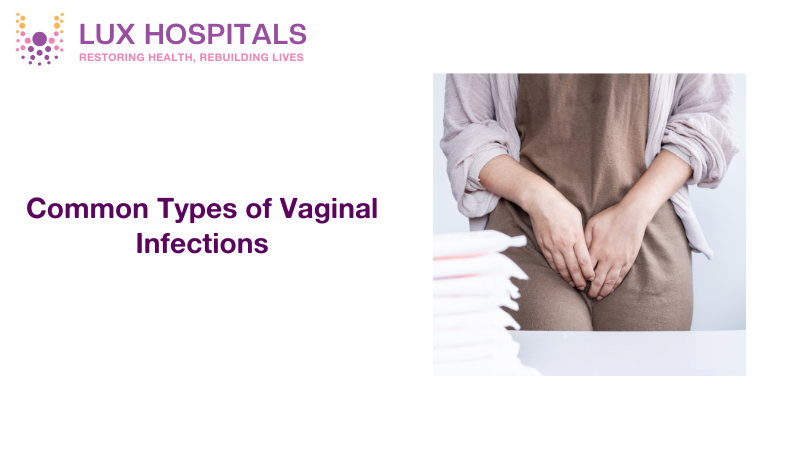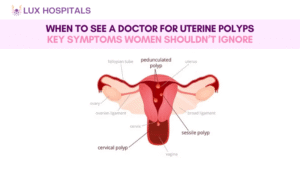Types of Vaginal Infection: Causes, Symptoms and Prevention

Vaginal health is a component of a woman’s overall health. But most women experience one or the other in their life. They can be minor irritations or serious ones that need medical attention. Women should be aware of the types of vaginal infections, the causes, symptoms, and precautions to prevent them so that they can have a healthy reproductive system.
The most prevalent types include bacterial vaginosis (BV), yeast infections (candidiasis), trichomoniasis, and viral infections like herpes. Symptoms may include itching, unusual discharge, odor, and discomfort. Identifying the cause is crucial for effective treatment.
Types of Vaginal Infections:
There are a number of types of vaginal infections that a woman can develop. The most frequent ones are:
- Bacterial Vaginosis (BV) – Due to an imbalance in the natural bacteria in the vagina.
- Yeast Infection (Candidiasis)-Due to an overgrowth of the Candida fungus.
- Trichomoniasis – A sexually transmitted infection (STI) caused by the parasite Trichomonas vaginalis.
- Chlamydia – Another STI caused by the bacterium Chlamydia trachomatis.
- Gonorrhea – A bacterial infection by the bacterium Neisseria gonorrhoeae.
- Genital Herpes – Caused by the herpes simplex virus (HSV).
- Human Papillomavirus (HPV) Infection – A viral infection causing warts and, in rare instances, cervical carcinoma.
- Non-Specific Vaginitis – Inflammation with no apparent bacterial or fungal cause.
- Cytolytic Vaginosis – Caused by a lactobacilli overgrowth, producing irritation and discomfort.
Causes of Vaginal Infections
Vaginal infections of different types of vaginal infections have different etiologies, but the most prevalent ones are:
- Vaginal flora imbalance: Disturbing the typical bacterial environment.
- Unprotected sex : Increases susceptibility to STIs.
- Poor hygiene habits: Failure to keep the area clean can result in infection.
- Hormonal alterations: pregnancy, menstruation, and menopause can be held accountable for vaginal pH changes.
- Antibiotic therapy: May kill beneficial bacteria, leading to yeast overgrowth.
- Douching : Disturbs the natural balance of bacteria in the vagina.
- Weakened immune system: Opens the body up to infection.
Symptoms of Vaginal Infections
Signs and symptoms differ according to the types of vaginal infections, but among the most common signs are:
- Abnormal discharge thick, white, yellow, or green discharge that smells bad.
- Itching and irritation recurring itchiness and soreness in the vaginal area.
- Burning during urination.
- Sexual pain because of inflammation or irritation.
- Redness and swelling of the vulva and vagina.
- Sore or blistering herpes viral infection.
- Urination more than usual at times with bacterial infection.
How Vaginal Infections Influence Women’s Health?
Untreated types of vaginal infections can cause a range of complications, including:
- Pelvic Inflammatory Disease (PID) : a secondary infection of the reproductive system that can result in infertility.
- Pregnancy complications: certain infections can cause preterm labor and delivery complications.
- Risk of STIs increased : Some vaginal infections predispose women to HIV and other sexually transmitted diseases.
- Chronic pain : Repeated infections can decrease quality of life.
- Emotional distress :Recurring infections can cause worry and low self-esteem.
Treatment of Vaginal Infections
Treatment of different types of vaginal infections varies with their cause:
- Antibiotics cure bacterial infections such as BV, chlamydia, and gonorrhea.
- Antifungal drugs treat yeast infections.
- Antiviral drugs treat herpes and HPV symptoms.
- Topical creams prescribed by doctors reduce itching and inflammation.
- Lifestyle changes good hygiene and avoiding irritants may aid in healing.
- Probiotic supplements may restore normal vaginal flora.
Life Style Changes for a Healthy Vagina
Subtle but powerful lifestyle changes promote different types of vaginal infections
- Good hygiene: gently wash the vaginal area with soap and water.
- Wear ventilating clothes: cotton undergarments to avoid moisture buildup.
- Don’t douche: this upsets the balance of vaginal flora.
- Stay hydrated: water helps remove toxins and keep natural lubrication intact.
- Healthy diet: add probiotic foods to promote good bacteria.
- Use protection during sex: protects against STIs and infection.
- Manage stress: too much stress can affect immunity and hormonal balance.
Avoid excessive sugar consumption, which can lead to yeast overgrowth.
Prevention Tips for Vaginal Infections
Prevention of types of vaginal infections includes
- Regular gynecological check-ups, early diagnosis, and treatment.
- Avoid perfumed hygiene products, e.g., soaps, wipes, and sprays.
- Correct wiping Always wipe from front to back to avoid bacterial transfer.
- Regular changing of sanitary products prevents bacterial growth.
- Probiotics maintain healthy vaginal flora.
- Antibiotic limitation which Employ antibiotics only when necessary to avoid bacterial imbalances.
Conclusion
Knowledge about the various types of vaginal infections is necessary for women’s health. If symptoms are recognized at the initial stage, after appropriate treatment and prevention methods are followed, women can maintain a healthy and infection-free vaginal area. Preventive measures not only prevent infection but also improve overall reproductive health. Maintaining good hygiene, practicing safe sex, and seeking prompt medical attention can help prevent all types of vaginal infections
Frequently Asked Questions
How do I know if I have an STI or vaginal infection?
Although the symptoms are the same, STIs will also have other symptoms such as pain during sex, sores, or fever. The only way to truly know is a doctor’s test.
Can a vaginal infection result from not being sexually active?
Yes, yeast infections and bacterial vaginosis can result from hormonal fluctuation, personal hygiene, or the use of antibiotics, but not sexual activity.
Can diet play a role in vaginal health?
Yes, diet probiotics, lowering sugar, and drinking fluids could be a help to vaginal health and alleviate infection.
Do vaginal infections clear up on their own?
Some of the minor ones, like yeast infections, can clear up on their own, but most need to be treated by a doctor to avoid complications.
How regularly should I receive gynecological check-ups?
Regular gynecologist visits and awareness of vaginal infections are key to maintaining good reproductive health. Early detection, proper treatment, and preventive care help women stay healthy and infection-free.




















